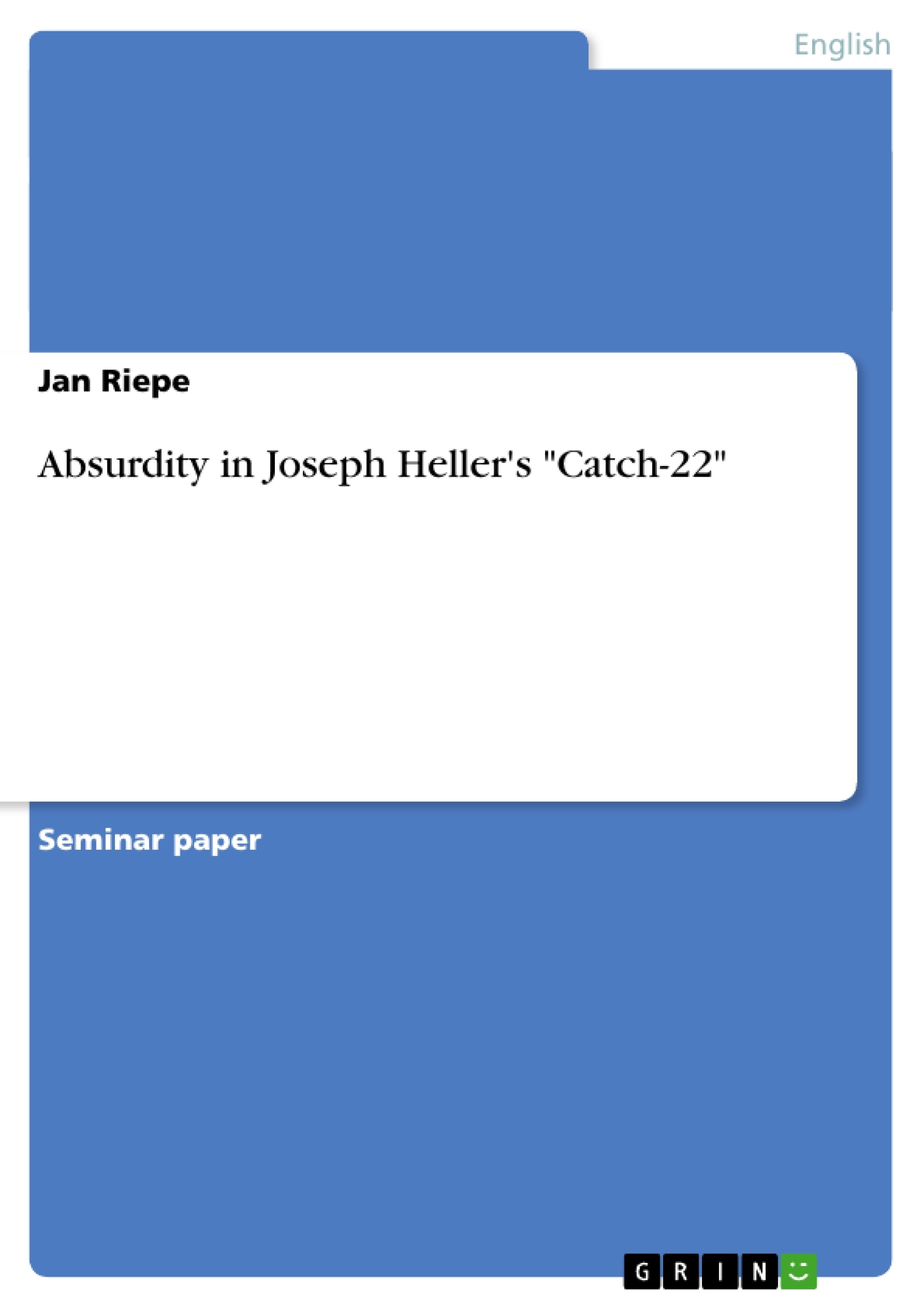The topic of this research paper is the absurd in Joseph Heller’s Catch-22. In the course of this paper I will show that Catch-22 belongs to the Literature of the Absurd, that Heller writes in the tradition of the absurd and that he uses absurdist techniques to describe his novel’s absurd and disjointed world. Yet the novel’s absurd vision differs radically from other literature of the absurd because instead of accepting the universe as absurd, Heller protests against the absurdity he describes. To support my thesis I will examine definitions and features of the Theatre of the Absurd and of the Literature of the Absurd and compare them to Catch-22. I will analyze the novel’s absurdist vision by looking at the absurdity of war, the absurdity of bureaucracy, absurdity of capitalism and at the famous catch-22. Further I will examine the failure of communication and the novel’s structure. To come to a valid conclusion I will then analyze the significance of absurdity in Catch-22. The Literature of the Absurd has its roots in the Theatre of the Absurd and the absurdist movement that emerged after World War II as a rebellion against traditional values and literature. Before the war it was commonly thought that man was a fairly rational creature who lives in an at least partly intelligible universe. It was believed that man was able to show heroism and dignity even in defeat. After the war then there was the tendency to view man as isolated and the universe as possessing no inherent truth, value or meaning. Jean Paul Sartre and Albert Camus, for example viewed the human being as an isolated existent who is cast into an alien universe, to conceive the universe as possessing no inherent truth, value or meaning, and to represent human life – in its fruitless search for purpose and meaning, as it moves in the nothingness whence it came toward the nothingness where it must end – as an existence which is both anguished and absurd.1 1 M. H. Abrahms. A Glossary of Literary Terms. 7th Edition, 1999. p. 1
Table of Contents
- Running to Responsibility: Absurdity in Joseph Heller's 'Catch-22'
- The Literature of the Absurd
- The Absurdist Vision of Catch-22
- War
- Bureaucracy
- Capitalism
Objectives and Key Themes
This research paper explores the concept of absurdity in Joseph Heller's novel "Catch-22." The primary goal is to demonstrate that the novel aligns with the Literature of the Absurd, highlighting Heller's use of absurdist techniques to depict a disjointed and absurd world. The paper further examines the novel's unique approach to the theme of absurdity, contrasting Heller's protest against absurdity with the acceptance of absurdity found in other absurdist works.
- The Nature of Absurdity in Literature and Theatre
- The Absurdity of War, Bureaucracy, and Capitalism in "Catch-22"
- Heller's Critique of Absurdity and His Rejection of a Nihilistic Worldview
- The Role of Absurdity in Shaping the Narrative Structure and Character Development
- The Significance of Absurdity as a Commentary on Post-World War II Society
Chapter Summaries
The paper begins by examining the origins and key features of the Theatre of the Absurd and the Literature of the Absurd, tracing their roots back to the post-World War II existentialist movement. It analyzes how these absurdist concepts are reflected in Heller's novel, highlighting the ways in which war, bureaucracy, and capitalism are presented as inherently absurd. The paper further delves into the novel's unique treatment of absurdity, showcasing how Heller, unlike other absurdist authors, actively protests against the absurdity he portrays, refusing to accept a nihilistic worldview. The analysis explores the narrative structure and character development of the novel, demonstrating how absurdity is employed to create a sense of alienation and disorientation. The paper ultimately concludes by examining the significance of absurdity in "Catch-22" as a commentary on the political, social, and moral landscape of post-World War II society.
Keywords
The key concepts explored in this paper include absurdity, existentialism, Theatre of the Absurd, Literature of the Absurd, Joseph Heller, "Catch-22," war, bureaucracy, capitalism, satire, narrative structure, character development, post-World War II society, and American literature. These keywords encapsulate the primary themes, theoretical frameworks, and critical considerations of the research.
- Quote paper
- M.A. Jan Riepe (Author), 2003, Absurdity in Joseph Heller's "Catch-22", Munich, GRIN Verlag, https://www.grin.com/document/38367




